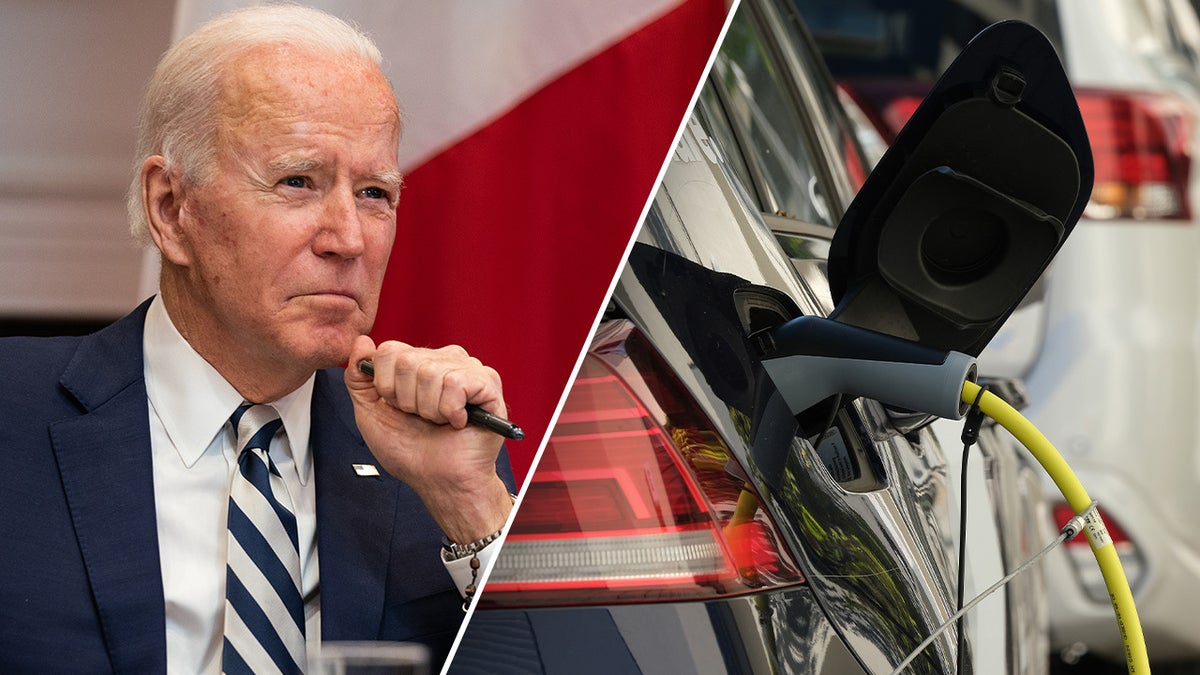West Virginia AG Patrick Morrisey says Biden’s electric vehicle push is ‘attack on rural America’
‘It defies common sense,’ Attorney General Patrick Morrisey told Fox News Digital.
FIRST ON FOX: A group of House Republicans is planning to introduce legislation Thursday that would prohibit the Biden administration from implementing proposed emissions standards designed to incentivize electric vehicle (EV) purchases.
Led by Reps. Tim Walberg, R-Mich., and Andrew Clyde, R-Ga., the Republicans are introducing the Choice in Automobile Retail Sales (CARS) Act in an effort to prevent the Environmental Protection Agency (EPA) from moving forward with its tailpipe emissions proposal unveiled earlier this year. The legislation could receive a markup hearing before the Energy and Commerce Committee as soon as next week.
"The Biden administration cannot continue to create regulations that limit consumer choice, hamper mobility, make vehicles more expensive for families, and cede America’s auto leadership and jobs to China," Walberg said in a statement. "Hardworking Americans have already experienced months of runaway inflation and high energy costs, and these efforts will only further increase the financial burden on Americans who cannot afford to purchase electric vehicles."
"This legislation would put a stop to this executive overreach, allowing consumers to have the freedom to decide what car works best for them and their families and preventing auto manufacturers from being forced to meet unrealistic mandates driven by the President’s Green New Deal agenda," he continued.

President Biden previously set a goal of ensuring 50% of car purchases are electric by 2030. The White House said EPA's recent tailpipe rules would provide a "clear pathway for a continued rise in EV sales." (Anna Moneymaker/Pool/Getty Images | Sean Gallup/Getty Images)
In April, EPA proposed the most aggressive federal tailpipe emissions ever crafted. If finalized and implemented, a staggering 67% of new sedan, crossover, SUV and light truck; up to 50% of bus and garbage truck; 35% of short-haul freight tractor; and 25% of long-haul freight tractor purchases could be electric by 2032, the White House projected.
In addition to blocking the EPA's recently-proposed tailpipe emissions regulations, the CARS Act would prohibit regulations mandating the use of any specific technology or regulations that limit the availability of new vehicles based on engine type. And, if passed, the legislation would require EPA to update any regulations that limit new vehicles based on engine type within two years.
PETE BUTTIGIEG CONSULTED CHINA-TIED GROUP PUSHING GAS STOVE BANS, ELECTRIC VEHICLE MANDATES
"From restrictions on gas stoves to gas-powered vehicles, the Biden Administration’s destructive energy policies are nothing more than thinly veiled attempts to expand government control into Americans’ daily lives," Clyde told Fox News Digital. "Restricting consumer choice to advance the Left’s Green New Deal agenda represents an illegitimate power grab that hardworking Americans — already burdened by soaring energy prices and record-high inflation — simply cannot afford."

Reps. Tim Walberg, R-Mich., (left) and Andrew Clyde, R-Ga., (right) introduced the Choice in Automobile Retail Sales Act on Thursday. (Bill Clark/CQ Roll Call via Getty Images | Anna Moneymaker/Getty Images)
"Furthermore, President Biden’s plan to force families and workers across the country to purchase pricey electric vehicles ultimately hurts Americans’ wallets while simultaneously enriching China, one of our greatest adversaries and a very dominant force in the EV market," Clyde added. "In response, the CARS Act provides a commonsense solution to protect both American consumers and auto manufacturers from the Biden Administration’s radical climate agenda and dangerous government overreach."
Since the Biden administration proposed the tailpipe emissions rules, which would impact car model years 2027 through 2032, Republicans and energy experts have blasted the actions. They argue EVs are costly, less efficient and more dependent on Chinese supply chains than traditional gas-powered cars.
CLICK HERE TO GET THE FOX NEWS APP
The average cost of an EV was $65,291 while the average cost of a car with an internal combustion engine was $48,094 as of last year, according to Kelley Blue Book. And the Department of Energy reported that the average range of model year 2021 gasoline vehicles was 403 miles compared to the median 234-mile range of model year 2021 EVs.
Reps. John James, R-Mich., Larry Bucshon, R-Ind., Neal Dunn, R-Fla., Randy Weber, R-Texas, August Pfluger, R-Texas, Russ Fulcher, R-Idaho, Claudia Tenney, R-N.Y., John Curtis, R-Utah, Keith Self, R-Texas, Mike Kelly, R-Pa., Troy Nehls, R-Texas, Harriet Hageman, R-Wyo., Rick Allen, R-Ga., Matt Rosendale, R-Mont., Tracey Mann, R- Kan., and John Moolenaar, R-Mich., were listed as cosponsors on the CARS Act.















































